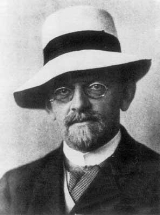
David Hilbert
Topics
David Hilbert
Quotations

Quotations
David Hilbert was a German mathematician recognized as one of the most influential and universal mathematicians of the 19th and early 20th centuries. He invented or developed a broad range of fundamental ideas, in invariant theory, the axiomatization of geometry, and with the notion of Hilbert space, one of the foundations of functional analysis.
Sourced
- Aus dem Paradies, das Cantor uns geschaffen, soll uns niemand vertreiben können.
- No one shall expel us from the Paradise that Cantor has created.
- "Über das Unendliche" [On the Infinite] in Mathematische Annalen 95, (1926)
- No one shall expel us from the Paradise that Cantor has created.
- Wir dürfen nicht denen glauben, die heute mit philosophischer Miene und überlegenem Tone den Kulturuntergang prophezeien und sich in dem Ignorabimus gefallen. Für uns gibt es kein Ignorabimus, und meiner Meinung nach auch für die Naturwissenschaft überhaupt nicht. Statt des törichten Ignorabimus heiße im Gegenteil unsere Losung:
-
- Wir müssen wissen — wir werden wissen!
- We must not believe those, who today, with philosophical bearing and deliberative tone, prophesy the fall of culture and accept the ignorabimus. For us there is no ignorabimus, and in my opinion none whatever in natural science. In opposition to the foolish ignorabimus our slogan shall be:
- We must know — we will know!
- Address to the Society of German Scientists and Physicians, in Königsberg (8 September 1930). The concluding statement was used as the epitaph on his tomb in Göttingen. Radio broadcast of the address, and transcription and English translation.
- Wir müssen wissen — wir werden wissen!
- One can measure the importance of a scientific work by the number of earlier publications rendered superfluous by it.
- Quoted in Mathematical Circles Revisited (1971) by Howard Whitley Eves
- Mathematics knows no races or geographic boundaries; for mathematics, the cultural world is one country.
- Quoted in Mathematical Circles Revisited (1971) by Howard Whitley Eves
- If one were to bring ten of the wisest men in the world together and ask them what was the most stupid thing in existence, they would not be able to discover anything so stupid as astrology.
- Quoted in Comic Sections (1993) by Desmond MacHale
- If I were to awaken after having slept for a thousand years, my first question would be: Has the Riemann hypothesis been proven?
- Quoted in Mathematical Mysteries : The Beauty and Magic of Numbers (1999) by Calvin C. Clawson, p. 258
- One of the supreme achievements of purely intellectual human activity.
- On the Cantor set, as quoted in A World Without Time : The Forgotten Legacy of Godel and Einstein (2005) by Palle Yourgrau, p. 44
Mathematical Problems (1900)
- History teaches the continuity of the development of science. We know that every age has its own problems, which the following age either solves or casts aside as profitless and replaces by new ones. If we would obtain an idea of the probable development of mathematical knowledge in the immediate future, we must let the unsettled questions pass before our minds and look over the problems which the science of today sets and whose solution we expect from the future. To such a review of problems the present day, lying at the meeting of the centuries, seems to me well adapted. For the close of a great epoch not only invites us to look back into the past but also directs our thoughts to the unknown future.
- A mathematical problem should be difficult in order to entice us, yet not completely inaccessible, lest it mock at our efforts. It should be to us a guide post on the mazy paths to hidden truths, and ultimately a reminder of our pleasure in the successful solution.
- It remains to discuss briefly what general requirements may be justly laid down for the solution of a mathematical problem. I should say first of all, this: that it shall be possible to establish the correctness of the solution by means of a finite number of steps based upon a finite number of hypotheses which are implied in the statement of the problem and which must always be exactly formulated. This requirement of logical deduction by means of a finite number of processes is simply the requirement of rigor in reasoning.
- To new concepts correspond, necessarily, new signs. These we choose in such a way that they remind us of the phenomena which were the occasion for the formation of the new concepts.
- If we do not succeed in solving a mathematical problem, the reason frequently consists in our failure to recognize the more general standpoint from which the problem before us appears only as a single link in a chain of related problems. After finding this standpoint, not only is this problem frequently more accessible to our investigation, but at the same time we come into possession of a method which is applicable also to related problems.
- Mathematical science is in my opinion an indivisible whole, an organism whose vitality is conditioned upon the connection of its parts. For with all the variety of mathematical knowledge, we are still clearly conscious of the similarity of the logical devices, the relationship of the ideas in mathematics as a whole and the numerous analogies in its different departments. We also notice that, the farther a mathematical theory is developed, the more harmoniously and uniformly does its construction proceed, and unsuspected relations are disclosed between hitherto separate branches of the science. So it happens that, with the extension of mathematics, its organic character is not lost but only manifests itself the more clearly.
- Mathematics is the foundation of all exact knowledge of natural phenomena.
Silverdale Interactive © 2026. All Rights Reserved.

